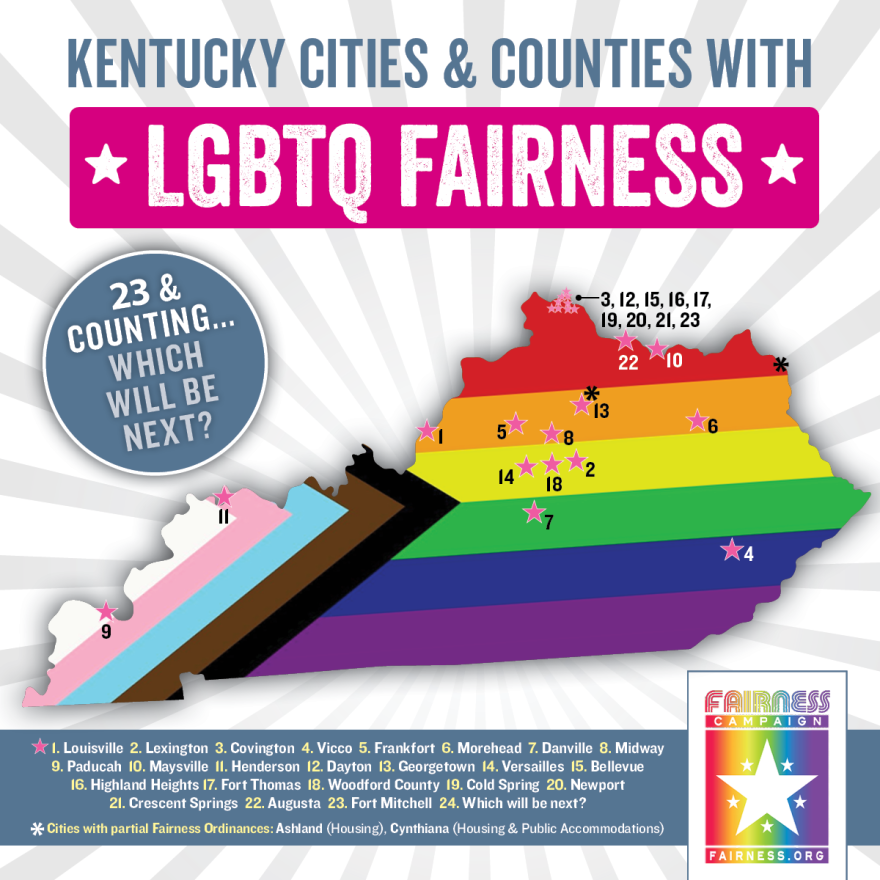Kentucky civil rights law explicitly protects individuals against discrimination based on race, sex, religion and nationality. Smokers, too, are considered a protected class. Some Kentucky lawmakers are again introducing legislation to also explicitly protect LGBTQ+ individuals.
Democratic State Rep. Lisa Willner and her four cosponsors — including Republican Rep. Kim Banta — have filed BR 45, which would update the statewide civil right acts to include sexual orientation and gender identity among the aforementioned protected classes, thus prohibiting discrimination against LGBTQ+ individuals in the areas of housing, employment and public accommodation.
“Folks don’t have civil rights protections under current law for sexual orientation or gender identity,” Willner said. “According to the limitations of state law, a person could lose housing, lose their employment or be denied basic services just for identifying as LGBTQ.”
The Supreme Court ruled last year protection from sex discrimination through the Civil Rights Act of 1964 also encompasses sexuality and gender identity. Some legal experts say LGBTQ+ individuals in states without explict protection from workplace discrimination based on sexual orientation and orientation, including Kentucky, can sue in federal courts with more potential success of recourse.
At the federal level, the most recent National Equality Act, if passed, would amend Title VII to explicitly prhobit discrimination based on sexual orientation and gender identity, and broaden protections in federally funded programs and public accommodations.
In the meantime, Willner and her cosponsors — alongside the Fairness Campaign, an advocacy group for LGBTQ+ individuals in Kentucky — are attempting to amend the state’s own civil rights law.
The Previous Attempts

A statewide fairness law for LGBTQ+ individuals was first introduced in the year 2000 by then-Rep. Kathy Stine, now a judge in Fayette County, and Rep. Mary Lou Marsian from Louisville, said Chris Hartman, executive director of the Fairness Campaign of the Fairness Coalition. He noted the fairness law has accrued increasing support with time.
“Supporters were very few and far between in those early years for the statewide fairness law,” Hartman said. “Now, typically, we have nearly a third of the entire Kentucky general assembly cosponsor the statewide fairness law.”
Hartman has spent the past 12 years backing anti-discrimination LGBTQ+ fairness ordinances in Kentucky cities. This, he said, has been the most effective way to secure such protections in lieu of statewide legislation. There are 23 municipalities in Kentucky with a fairness ordinance in place, including Paducah. Willner said those ordinances protect about one-third of Kentuckians.
The Louisville board of alderman passed its fairness ordinance in 1999 after it had been introduced in 1991. The Lexington-Fayette Urban County Council followed suit shortly after. Both initiatives were supported by the Fairness Campaign.
Willner, the state representative, is a Unitarian Universalist and has served as the executive director of the Kentucky Psychological Association. Shebecame the primary sponsor of the annually filed fairness bill in the 2020 session, the first year the bill garnered bipartisan support.
She said there has been more bipartisan support as more legislators have come to view LGBTQ+ protections as “fundamental human rights.”
“We [psychologists] understand the trauma that caused by discrimination, the trauma that’s caused by people being viewed by less than fully human,” Willner said. “I’m also of a faith tradition that explicitly lists out the inherent worth and value of every person. It’s something that I believe deep in my soul and something of value that I raised my family with, that we don’t treat one group of human beings as less than another, and the laws need to reflect that.”
A Complex Issue

Defining anti-discrimination in housing and employment is fairly straightforward, Hartman said, but less so in public accommodation due to crossover with free speech protections guaranteed by the first ammendment of the U.S. Constitution. For example, a baker could likely deny making a customized wedding cake under the first amendment.
“Under a fairness ordinance, a bakery would be required to sell anything that’s in the bakery to an LGBTQ person the same way they would sell to anyone else, unless we’re talking about a customized cake,” Hartman said. “But you can’t not sell the person just the plain cake that’s in the display case for you to take home and do whatever you want with.”
A federal judge recently ruled that the Louisville’s Fairness Ordinance could not be enforced against a wedding photographer’s refusal to serve to same-sex couples without unconstitutionally violating her freedom of religion and speech.
“The presumption is that, once a statewide fairness law passes in Kentucky or once the Equality Act passes for the United States, at the base level, LGBTQ people would be included in discrimination protections across the board,” Hartman said. “Then, there will be this more narrow question about what are free speech protections.”
For now, Willner and Hartman are focused on securing rights to which they believe all LGBTQ+ individuals should be entitled. Willner is also the primary sponsor of BR 49, prohibiting mental health professionals from offering sexual orientation and gender identity change therapy, and BR 119, requiring schools to offer to students LGBTQ+-inclusive health education.




